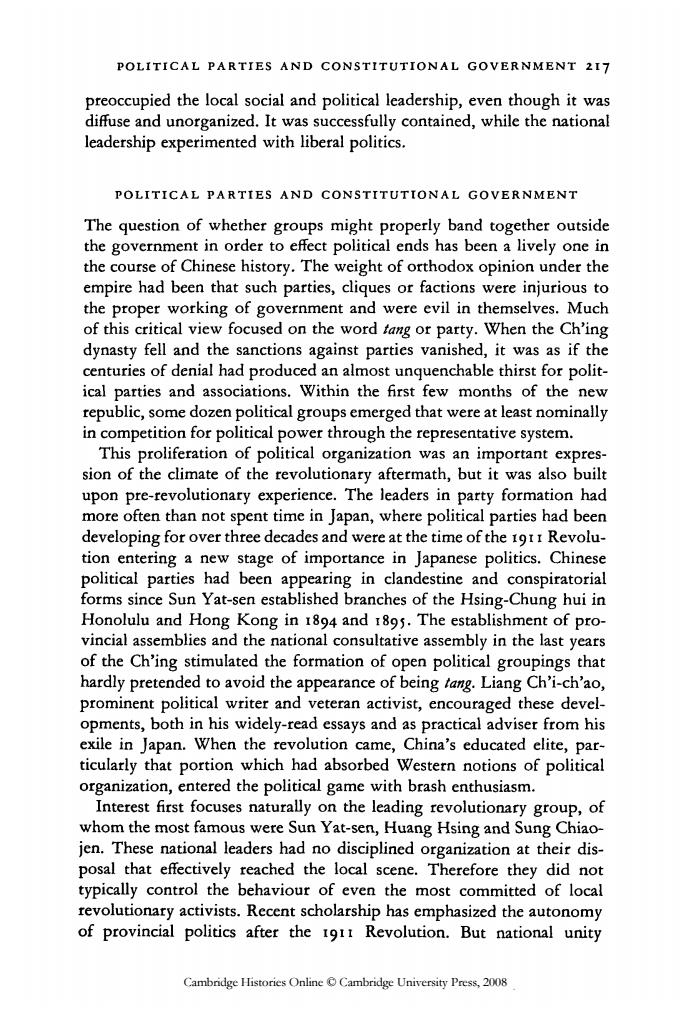正在加载图片...

POLITICAL PARTIES AND CONSTITUTIONAL GOVERNMENT 2I7 preoccupied the local social and political leadership,even though it was diffuse and unorganized.It was successfully contained,while the national leadership experimented with liberal politics. POLITICAL PARTIES AND CONSTITUTIONAL GOVERNMENT The question of whether groups might properly band together outside the government in order to effect political ends has been a lively one in the course of Chinese history.The weight of orthodox opinion under the empire had been that such parties,cliques or factions were injurious to the proper working of government and were evil in themselves.Much of this critical view focused on the word fang or party.When the Ch'ing dynasty fell and the sanctions against parties vanished,it was as if the centuries of denial had produced an almost unquenchable thirst for polit- ical parties and associations.Within the first few months of the new republic,some dozen political groups emerged that were at least nominally in competition for political power through the representative system. This proliferation of political organization was an important expres- sion of the climate of the revolutionary aftermath,but it was also built upon pre-revolutionary experience.The leaders in party formation had more often than not spent time in Japan,where political parties had been developing for over three decades and were at the time of the i9tI Revolu- tion entering a new stage of importance in Japanese politics.Chinese political parties had been appearing in clandestine and conspiratorial forms since Sun Yat-sen established branches of the Hsing-Chung hui in Honolulu and Hong Kong in 1894 and 1895.The establishment of pro- vincial assemblies and the national consultative assembly in the last years of the Ch'ing stimulated the formation of open political groupings that hardly pretended to avoid the appearance of being tang.Liang Ch'i-ch'ao, prominent political writer and veteran activist,encouraged these devel- opments,both in his widely-read essays and as practical adviser from his exile in Japan.When the revolution came,China's educated elite,par- ticularly that portion which had absorbed Western notions of political organization,entered the political game with brash enthusiasm. Interest first focuses naturally on the leading revolutionary group,of whom the most famous were Sun Yat-sen,Huang Hsing and Sung Chiao- jen.These national leaders had no disciplined organization at their dis- posal that effectively reached the local scene.Therefore they did not typically control the behaviour of even the most committed of local revolutionary activists.Recent scholarship has emphasized the autonomy of provincial politics after the I9It Revolution.But national unity Cambridge Histories Online Cambridge University Press,2008POLITICAL PARTIES AND CONSTITUTIONAL GOVERNMENT ZIJ preoccupied the local social and political leadership, even though it was diffuse and unorganized. It was successfully contained, while the national leadership experimented with liberal politics. POLITICAL PARTIES AND CONSTITUTIONAL GOVERNMENT The question of whether groups might properly band together outside the government in order to effect political ends has been a lively one in the course of Chinese history. The weight of orthodox opinion under the empire had been that such parties, cliques or factions were injurious to the proper working of government and were evil in themselves. Much of this critical view focused on the word tang or party. When the Ch'ing dynasty fell and the sanctions against parties vanished, it was as if the centuries of denial had produced an almost unquenchable thirst for political parties and associations. Within the first few months of the new republic, some dozen political groups emerged that were at least nominally in competition for political power through the representative system. This proliferation of political organization was an important expression of the climate of the revolutionary aftermath, but it was also built upon pre-revolutionary experience. The leaders in party formation had more often than not spent time in Japan, where political parties had been developing for over three decades and were at the time of the 1911 Revolution entering a new stage of importance in Japanese politics. Chinese political parties had been appearing in clandestine and conspiratorial forms since Sun Yat-sen established branches of the Hsing-Chung hui in Honolulu and Hong Kong in 1894 and 1895. The establishment of provincial assemblies and the national consultative assembly in the last years of the Ch'ing stimulated the formation of open political groupings that hardly pretended to avoid the appearance of being tang. Liang Ch'i-ch'ao, prominent political writer and veteran activist, encouraged these developments, both in his widely-read essays and as practical adviser from his exile in Japan. When the revolution came, China's educated elite, particularly that portion which had absorbed Western notions of political organization, entered the political game with brash enthusiasm. Interest first focuses naturally on the leading revolutionary group, of whom the most famous were Sun Yat-sen, Huang Hsing and Sung Chiaojen. These national leaders had no disciplined organization at their disposal that effectively reached the local scene. Therefore they did not typically control the behaviour of even the most committed of local revolutionary activists. Recent scholarship has emphasized the autonomy of provincial politics after the 1911 Revolution. But national unity Cambridge Histories Online © Cambridge University Press, 2008